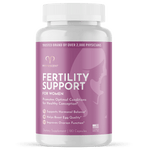We'll cover how to boost your fertility in your 30s, and provide you with helpful tips for getting pregnant. With a few lifestyle changes, conceiving can be more possible.


reviews


reviews

The quality and quantity of eggs decrease as women age, and there is no exact age to pinpoint when it happens. But, studies suggest that women's fertility drops in their late 30s and early 40s.
According to Dr. Abby Blen of the Nashville Fertility Center, “The decline in quality and in the number of eggs occurs more quickly beyond age 35.”
Research shows that an unwanted delay in conception affects one in six couples. Of those couples, about half will eventually conceive spontaneously or with a bit of help and advice.
Different strategies for boosting fertility in your 30s include eating a healthy diet, avoiding excessive drinking, and not smoking.
A study found that women lost 90% of their eggs by age 30, and only had 3% remaining by age 40.
Irregular periods can potentially indicate that a woman is having issues with ovulation.
Fertility experts recommend starting with simple lifestyle changes that help those struggling with infertility, including reducing alcohol intake, keeping weight within a healthy range, and eating a diet rich in unsaturated fats, whole grains, veggies, and fish.
Healthful living is just one way to address infertility. Let's look at the different ways to boost fertility in your 30s.
You can improve your chances of getting pregnant in your 30s using a variety of natural approaches that include:
Plenty of research is available that connects low and high BMI to the struggle of trying to conceive.
As Dr. Eblen explains, “Having a normal body weight can positively affect fertility. If a woman is very thin or very heavy, it may be more difficult for her to release an egg every month.”
Women with a high body mass index (BMI) may produce more of the hormone leptin, which can lower fertility.
At the same time, women that are underweight may face fertility problems due to hormonal imbalances.
Discuss with your doctor or a licensed dietician about the impact of weight on fertility. You can come up with a plan together on how to achieve a healthy weight that makes sense for you.
It's proven that excessive alcohol consumption is linked to infertility in men. Heavy use results in sperm mobility issues.
Research on how alcohol affects fertility in women is limited and ongoing. But we do know that alcohol does have harmful effects on pregnancies.
When trying to conceive, changing to mocktails is a good strategy for how to improve fertility and prepare for a future pregnancy.
Dr. Eblen stresses that eating a healthy balanced diet can be helpful with fertility. But there's no one magical food or beverage that will do the trick.
Focusing on whole foods that are high in unsaturated fats, whole grains, veggies, and fish can help increase the odds of getting pregnant.
Dr. Ablen emphasizes that healthy fats are the building blocks for hormones. Here are a few foods to consider:
Diets that are high in sugar and saturated fat have been linked by research to lower fertility outcomes.
Women trying to get pregnant should avoid certain foods, such as:
Remember, it takes two people to conceive. A change in diet needs to be a two-way street.
Consult your physician anytime you start a new diet, especially when pregnant or trying to get pregnant.
The link between stress and fertility has been elusive, but it's hypothesized that emotional stress affects egg maturity. And women undergoing fertility treatment naturally experience more stress, which puts them at exceptionally high risk.
De-stressing includes delegating home and work tasks, getting at least 8 hours of sleep, and self-care.
Yoga and meditation are great ways to relax and are proven to help alleviate stress in women struggling with infertility.
According to research, physical inactivity or sedentary behavior in women can lead to struggles with infertility.
You can naturally increase the chances of getting pregnant by just adding a 30 or 40-minute walk to your routine.
Dr. Eblen notes that exercise can be helpful as long as it’s not done to the extreme.
One study shows that too much exercise can cause a woman's body to skip ovulation or have implant failure.
Have a chat with your doctor about striking a balance when it comes to exercise and boosting fertility.
You don't have to skip your morning caffeine to boost fertility.
But, it is proven that any more than 300mg (1 cup) can decrease the odds of conceiving.
Enjoy a morning cup of coffee; just avoid all-day espresso shots when trying to get pregnant.
Prenatal vitamins are an essential part of a healthy pregnancy and help the development of a baby's nervous system, skin, eyes, and lungs.
You can start to fill in those nutritional gaps pre-pregnancy by taking vitamins and minerals, including:
Folic acid is recommended for women of childbearing that are trying to conceive. You can add folic acid to your diet using supplements such as Fertility Support for Her or by eating folate-rich foods like eggs, leafy greens, and berries.
For older women, Dr. Eblen suggests that supplementation with coenzyme Q 10 may help with improving the likelihood of healthy eggs.
A doctor can help determine any vitamin deficiencies by running blood tests. Always talk to a medical professional before beginning any supplement.
According to one study, women who smoke cigarettes have a 14% more chance of experiencing infertility than a nonactive smoker.
It takes about three months after quitting smoking to fully restore both sperm and egg production.
Cigarettes and secondhand smoke are toxins that affect hormones and ovulation. Toxins are dangerous for pregnant women and can build up in a woman's body pre-pregnancy.
As Dr. Eblen explains, “The egg number can be negatively impacted if a woman smokes. Smoking damages eggs, and many women who smoke have a lower egg number compared to women their same age.”
Cigarette smoke is not the only toxin that can cause a decrease in fertility.
Overexposure to environmental toxins can cause hormone disruption and reproductive system damage in both men and women.
Dangerous chemicals and environmental toxins include:
According to the Centers for Disease Control and Prevention (CDC), Chlamydia and gonorrhea are STIs that can cause pelvic inflammatory disease (PID) and infertility in women.
Chlamydia can cause a fallopian tube infection that leads to infertility. Fallopian tube infection often happens with no symptoms.
The CDC recommends that sexually active women under the age of 25 and those with risk factors such as new sex partners receive annual screenings for Chlamydia and gonorrhea.
Any recreational drug use comes with the risk of harming a pregnancy. But, partaking can also decrease fertility in men and women.
For women, marijuana use can affect ovulation and reduce the chances of conceiving.
Other drugs, including benzodiazepines and opiates, can cause fertility issues and are dangerous for women already pregnant.
Sometimes infertility is out of our control and can be due to an underlying health condition.
Issues such as scarring to the uterus or fallopian tubes aren't fixable by a change in diet and require the attention of a medical professional.
Keep an open line of communication with your doctor about your fertility journey so that together you can come up with strategies and treatments that may work for you.
Dr. Eblen mentions the following scenarios as a time when a woman should consider seeing a doctor for fertility treatment:
The first step to boosting fertility naturally is finding the right balance in terms of what you eat, how you exercise, and your stress level.
Getting your weight within a healthy range, eating smarter, and exercising right are easy ways to boost fertility that don't require medical intervention.
Stopping alcohol consumption and smoking, decreasing caffeine intake, and avoiding recreational drug use are lifestyle changes that will increase the chances of conceiving spontaneously.
Don't forget a little self-care. Reducing your stress levels, meditation, and yoga are ways to boost your mental health and fertility.
Sometimes changing your diet isn't enough to fill in nutritional gaps. Natural supplements are available that contain some needed vitamins and minerals.
Talk to your doctor about how to increase fertility, and keep them in the loop when deciding to change your diet or start a supplement.

Dr. Abby Eblen is a board-certified reproductive endocrinologist who has practiced at Nashville Fertility Center since 2002. She completed medical school at the University of Tennessee and did residency in Obstetrics & Gynecology at the University of Florida. Her fellowship training was in Reproductive Endocrinology & Infertility. She is actively engaged in private practice at Nashville Fertility Center. In 2020 she launched the "Fertility Docs Uncensored" podcast with two other reproductive endocrinologists to provide truthful information about infertility.
Absorption Pharmaceuticals LLC (Promescent) has strict informational citing guidelines and relies on peer-reviewed studies, academic or research institutions, medical associations, and medical experts. We attempt to use primary sources and refrain from using tertiary references and only citing trustworthy sources. Each article is reviewed, written, and updated by Medical Professionals or authoritative Experts in a specific, related field of practice. You can find out more about how we ensure our content is accurate and current by reading our editorial policy.
Taylor A. ABC of subfertility: extent of the problem. BMJ. 2003 Aug 23;327(7412):434-6. doi: 10.1136/bmj.327.7412.434. PMID: 12933733; PMCID: PMC188498. Accessed on Jul, 12, 2023.
Zhu L, Zhou B, Zhu X, Cheng F, Pan Y, Zhou Y, Wu Y, Xu Q. Association Between Body Mass Index and Female Infertility in the United States: Data from National Health and Nutrition Examination Survey 2013-2018. Int J Gen Med. 2022 Feb 19;15:1821-1831. doi: 10.2147/IJGM.S349874. PMID: 35221716; PMCID: PMC8865871. Accessed on Jul, 12, 2023.
Silvestris E, de Pergola G, Rosania R, Loverro G. Obesity as disruptor of the female fertility. Reprod Biol Endocrinol. 2018 Mar 9;16(1):22. doi: 10.1186/s12958-018-0336-z. PMID: 29523133; PMCID: PMC5845358. Accessed on Jul, 12, 2023.
Aladashvili-Chikvaidze N, Kristesashvili J, Gegechkori M. Types of reproductive disorders in underweight and overweight young females and correlations of respective hormonal changes with BMI. Iran J Reprod Med. 2015 Mar;13(3):135-40. PMID: 26000003; PMCID: PMC4426152. Accessed on Jul, 12, 2023.
Van Heertum K, Rossi B. Alcohol and fertility: how much is too much? Fertil Res Pract. 2017 Jul 10;3:10. doi: 10.1186/s40738-017-0037-x. PMID: 28702207; PMCID: PMC5504800. Accessed on Jul, 12, 2023.
"Key Findings: The effects of alcohol use during pregnancy and later developmental outcomes: An analysis of previous studies - CDC." Cdc.gov, 2021, www.cdc.gov/ncbddd/fasd/features/key-finding-acer.html. Accessed on Jul, 12, 2023.
Panth N, Gavarkovs A, Tamez M, Mattei J. The Influence of Diet on Fertility and the Implications for Public Health Nutrition in the United States. Front Public Health. 2018 Jul 31;6:211. doi: 10.3389/fpubh.2018.00211. PMID: 30109221; PMCID: PMC6079277. Accessed on Jul, 12, 2023.
Panth N, Gavarkovs A, Tamez M, Mattei J. The Influence of Diet on Fertility and the Implications for Public Health Nutrition in the United States. Front Public Health. 2018 Jul 31;6:211. doi: 10.3389/fpubh.2018.00211. PMID: 30109221; PMCID: PMC6079277. Accessed on Jul, 12, 2023.
Foucaut AM, Faure C, Julia C, Czernichow S, Levy R, Dupont C; ALIFERT collaborative group. Sedentary behavior, physical inactivity and body composition in relation to idiopathic infertility among men and women. PLoS One. 2019 Apr 24;14(4):e0210770. doi: 10.1371/journal.pone.0210770. PMID: 31017887; PMCID: PMC6481765. Accessed on Jul, 12, 2023.
Evenson KR, Hesketh KR. Studying the Complex Relationships Between Physical Activity and Infertility. Am J Lifestyle Med. 2016 Jul-Aug;10(4):232-234. doi: 10.1177/1559827616641379. Epub 2016 Jul 12. PMID: 27895545; PMCID: PMC5123562. Accessed on Jul, 12, 2023.
Lyngsø J, Ramlau-Hansen CH, Bay B, Ingerslev HJ, Hulman A, Kesmodel US. Association between coffee or caffeine consumption and fecundity and fertility: a systematic review and dose-response meta-analysis. Clin Epidemiol. 2017 Dec 15;9:699-719. doi: 10.2147/CLEP.S146496. PMID: 29276412; PMCID: PMC5733907. Accessed on Jul, 12, 2023.
Skoracka K, Ratajczak AE, Rychter AM, Dobrowolska A, Krela-Kaźmierczak I. Female Fertility and the Nutritional Approach: The Most Essential Aspects. Adv Nutr. 2021 Dec 1;12(6):2372-2386. doi: 10.1093/advances/nmab068. PMID: 34139003; PMCID: PMC8634384. Accessed on Jul, 12, 2023.
Meng X, Zhang J, Wan Q, Huang J, Han T, Qu T, Yu LL. Influence of Vitamin D supplementation on reproductive outcomes of infertile patients: a systematic review and meta-analysis. Reprod Biol Endocrinol. 2023 Feb 3;21(1):17. doi: 10.1186/s12958-023-01068-8. PMID: 36737817; PMCID: PMC9896710. Accessed on Jul, 12, 2023.
Garner TB, Hester JM, Carothers A, Diaz FJ. Role of zinc in female reproduction. Biol Reprod. 2021 May 7;104(5):976-994. doi: 10.1093/biolre/ioab023. PMID: 33598687; PMCID: PMC8599883. Accessed on Jul, 12, 2023.
Grieger JA, Grzeskowiak LE, Wilson RL, Bianco-Miotto T, Leemaqz SY, Jankovic-Karasoulos T, Perkins AV, Norman RJ, Dekker GA, Roberts CT. Maternal Selenium, Copper and Zinc Concentrations in Early Pregnancy, and the Association with Fertility. Nutrients. 2019 Jul 16;11(7):1609. doi: 10.3390/nu11071609. PMID: 31315178; PMCID: PMC6683068. Accessed on Jul, 12, 2023.
Hernáez Á, Wootton RE, Page CM, Skåra KH, Fraser A, Rogne T, Magnus P, Njølstad PR, Andreassen OA, Burgess S, Lawlor DA, Magnus MC. Smoking and infertility: multivariable regression and Mendelian randomization analyses in the Norwegian Mother, Father and Child Cohort Study. Fertil Steril. 2022 Jul;118(1):180-190. doi: 10.1016/j.fertnstert.2022.04.001. Epub 2022 May 10. PMID: 35562204; PMCID: PMC7612999. Accessed on Jul, 12, 2023.
Hernáez Á, Wootton RE, Page CM, Skåra KH, Fraser A, Rogne T, Magnus P, Njølstad PR, Andreassen OA, Burgess S, Lawlor DA, Magnus MC. Smoking and infertility: multivariable regression and Mendelian randomization analyses in the Norwegian Mother, Father and Child Cohort Study. Fertil Steril. 2022 Jul;118(1):180-190. doi: 10.1016/j.fertnstert.2022.04.001. Epub 2022 May 10. PMID: 35562204; PMCID: PMC7612999. Accessed on Jul, 12, 2023.
Pizzorno J. Environmental Toxins and Infertility. Integr Med (Encinitas). 2018 Apr;17(2):8-11. PMID: 30962779; PMCID: PMC6396757. Accessed on Jul, 12, 2023.
Lin J, Lin X, Qiu J, You X, Xu J. Association between heavy metals exposure and infertility among American women aged 20-44 years: A cross-sectional analysis from 2013 to 2018 NHANES data. Front Public Health. 2023 Feb 14;11:1122183. doi: 10.3389/fpubh.2023.1122183. PMID: 36866101; PMCID: PMC9971928. Accessed on Jul, 12, 2023.
Ziv-Gal A, Flaws JA. Evidence for bisphenol A-induced female infertility: a review (2007-2016). Fertil Steril. 2016 Sep 15;106(4):827-56. doi: 10.1016/j.fertnstert.2016.06.027. Epub 2016 Jul 12. PMID: 27417731; PMCID: PMC5026908. Accessed on Jul, 12, 2023.
Crawford NM, Fenton SE, Strynar M, Hines EP, Pritchard DA, Steiner AZ. Effects of perfluorinated chemicals on thyroid function, markers of ovarian reserve, and natural fertility. Reprod Toxicol. 2017 Apr;69:53-59. doi: 10.1016/j.reprotox.2017.01.006. Epub 2017 Jan 19. PMID: 28111093; PMCID: PMC5690561. Accessed on Jul, 12, 2023.
Laws MJ, Neff AM, Brehm E, Warner GR, Flaws JA. Endocrine disrupting chemicals and reproductive disorders in women, men, and animal models. Adv Pharmacol. 2021;92:151-190. doi: 10.1016/bs.apha.2021.03.008. Epub 2021 May 3. PMID: 34452686; PMCID: PMC9743013.
Jurewicz J, Radwan M, Wielgomas B, Karwacka A, Klimowska A, Kałużny P, Radwan P, Hanke W. Parameters of ovarian reserve in relation to urinary concentrations of parabens. Environ Health. 2020 Mar 2;19(1):26. doi: 10.1186/s12940-020-00580-3. PMID: 32122340; PMCID: PMC7053057. Accessed on Jul, 12, 2023.
"STDs & Infertility - CDC." Cdc.gov, 2023, https://www.cdc.gov/std/infertility/default.htm#. Accessed on Jul, 12, 2023.
Ross EJ, Graham DL, Money KM, Stanwood GD. Developmental consequences of fetal exposure to drugs: what we know and what we still must learn. Neuropsychopharmacology. 2015 Jan;40(1):61-87. doi: 10.1038/npp.2014.147. Epub 2014 Jun 18. PMID: 24938210; PMCID: PMC4262892. Accessed on Jul, 12, 2023.
Wall-Wieler E, Robakis TK, Lyell DJ, Masarwa R, Platt RW, Carmichael SL. Benzodiazepine use before conception and risk of ectopic pregnancy. Hum Reprod. 2020 Jul 1;35(7):1685-1692. doi: 10.1093/humrep/deaa082. PMID: 32485732; PMCID: PMC7368395. Accessed on Jul, 12, 2023.
Flannagan KS, Mumford SL, Sjaarda LA, Radoc JG, Perkins NJ, Andriessen VC, Zolton JR, Silver RM, Schisterman EF. Is opioid use safe in women trying to conceive? Epidemiology. 2020 Nov;31(6):844-851. doi: 10.1097/EDE.0000000000001247. PMID: 33311959; PMCID: PMC7725439. Accessed on Jul, 12, 2023.
"Nashville Fertility Center - Nashville Fertility." Nashvillefertility.com, 2023, www.nashvilefertility.com. Accessed on Jul, 20, 2023.

reviews
Your Cart Is Empty